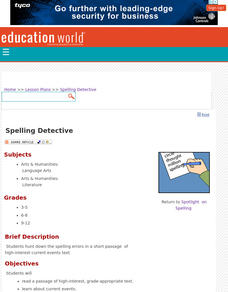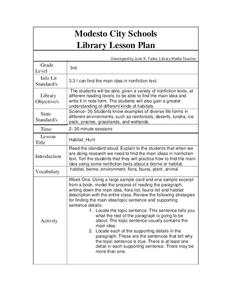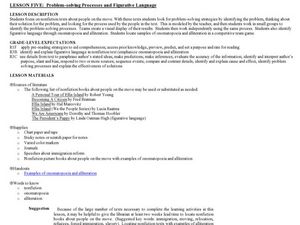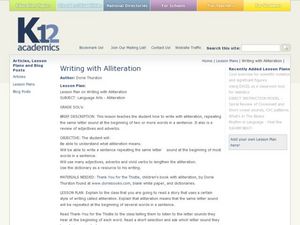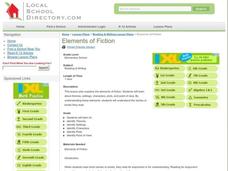School District No. 71
Adding Written Detail: Using Jane Yolen’s Owl Moon as a Mentor Text
Access your senses with a worksheet on sensory language. Based on Owl Moon by Jane Yolen, the worksheet prompts kids to find examples of each of the five senses, as well as phrases for inner emotion.
Curated OER
Descriptive Writing Using the Book Rumpelstiltskin
Use the fairy tale Rumpelstiltskin to teach your third grade class about descriptive writing. Following a teacher read-aloud of the story, the class brainstorms a list of adjectives describing the main character. Students use this list...
Curated OER
Vocabulary through Text
Explore word meanings. Sixth graders identify examples of words with affixes while listening to the story Paul Bunyan by Steven Kellogg. They participate in the game "Pass the Parts" and practice separating given words into their root...
Curated OER
Newcomers
Explore emotions associated with moving to a new home with young learners. First they listen to the books Painted Words/Spoken Memories by Aliki and Going Home by Eve Bunting. Then they are invited to share their experiences as well as...
Curated OER
Identify Intended Media Messages
How does media convey different messages? Use this instructional activity to explore media by identifying and analyzing selected images. Middle schoolers analyze a poster and discuss the intended meaning of the imagery and how it makes...
Scholastic
Follow the Clues
Invite your text detectives to bring their magnifying glasses to school to examine the clues in a text and make predictions. They write down three clues and a prediction on the graphic organizer.
Student Handouts
Why Does an Author Write?
To get to the heart of a writer's purpose, just remember to have some PIE (Persuade, Inform, or Entertain)! And appropriately, here is a PIE chart that leaves room for pupils to identify each letter of the acronym and any other ideas or...
Curated OER
Spelling Detective
Put on your Sherlock Holmes hat and become a spelling detective! Scholars hunt down the spelling errors in a short passage of a high-interest current events text. Here is a great way to develop editing and reading skills.
Curated OER
Hatchet: Vocabulary Strategy
Want your class to use critical thinking when discussing vocabulary? Go beyond the dictionary with a vocabulary activity based on Gary Paulsen's Hatchet. Kids write the word in the center of a graphic organizer that also provides places...
Curated OER
Theater: Create a Script
Figurative language is the focus in the book Teach Us, Amelia Bedelia. After reading Peggy Parish's book, class members dramatize idioms from the text, using dramatic strategies such as characterization, exaggeration, and improvisation....
Worksheet Web
What did it Say? – Summarizing
Provide scholars with an opportunity to practice summarizing text with a two-page learning exercise. Learners read poems, share stories with their peers, and summarize their new-found-knowledge.
Curated OER
Habitat Hunt
Third graders read several nonfiction texts and practice finding the main idea for the text as well as learn about various habitats. In this main idea instructional activity, 3rd graders read several nonfiction texts and make habitat...
Curated OER
Author's Purpose Lesson Plans
Why do we practice identifying the author's purpose? Read this article to gain a better understanding of this reading strategy, and then peruse the attached lesson plans!
Curated OER
Problem-Solving Processes and Figurative Language
Nonfiction texts about people on the move provide young readers with an opportunity to examine not only the problem-solving strategies employed by immigrants, but to also find examples of figurative language these writers use to tell...
Curated OER
Acrostic Book Report
Students read the story Wild Horse Winter and construct acrostic poems. In this poetry lesson, students use adjectives and events in the text to develop an acrostic poem.
Curated OER
Blanket the Plains
Students discuss vivid imagery in a story. In this figurative language lesson, students read samples of sensory language and then discuss the meaning of a piece of figurative language. Students provide examples.
Curated OER
Writing with Alliteration
Students read Thank You for the Thistle and understand what alliteration is. In this alliteration instructional activity, students write sentences using alliteration. Students choose a letter of the alphabet and the class writes an...
Warren County Public Schools
Small Group Discussion Questions
Support a class reading of the novel Song of the Trees by Mildred D. Taylor with this series of discussion questions. Covering a variety of topics from character and setting to historical accuracy and symbolism, these questions challenge...
Roald Dahl
Matilda - The Ghost
How do you think the parrot in "The Ghost" chapter of Matilda feels in the chimney? Put a class member in the hot seat and have the class ask questions relating to how they might have felt if they were the parrot in the chimney. Then,...
Curated OER
Elements of Fiction
Students identify key story elements in a fiction text. In this literacy lesson, students are introduced to the various elements of fiction such as the setting, plot, and theme. Students read a short story of their choice and identify...
Curated OER
Mood and Tone
In this literary elements worksheet, students fill in the graphic organizer by writing down the mood and tone of the writing piece. There are three boxes for students to fill in details about the mood, as well as the tone.
Curated OER
Characterization
A 46-slide presentation focuses on ways to describe characters in stories, how to create story characters, and how to show a character's personality in a student-created story. The colorful and engaging slides provide lots of great ideas...
All for KIDZ
Building Relationships: The Orphan of Ellis Island
Family and friendship are two very important themes of the historical fiction novel The Orphan of Ellis Island by Elvira Woodruff. From video clips and writing prompts to reader's theater and family interviews, this resource provides...
Roald Dahl
Matilda - Miss Trunchbull
How would you react to the Trunchbull if she was your teacher? This is the focus of an activity that has readers imagining and then acting out their reactions to various Trunchball scenarios in the story.









